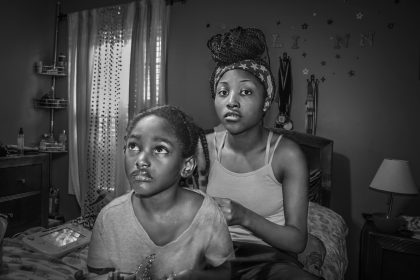
Next in our series focusing on the 2018 Gold Medal Portfolio recipients are artist Zaria Dudley and writer Malachi Jones. Both Zaria and Malachi use their art and writing to explore what it means to be African-Americans in the United States. Zaria’s photographs tell the story of her southern roots while Malachi writes about being a young black man in South Carolina.
Zaria Dudley
“It is my intention to produce photographs that showcase the positive aspects of the African American community. I am eager to examine the lifestyle and culture of African American families. My goal is to have people view my work and change their perspective about a southern black family. Many photos of African Americans lack their rich culture, urban life, changes, family, and involvement in the world. We have large house and small cottages. We have doctors, soldiers, teachers, and engineers. I do not simply document their lives, but more so tell their story. Every image creates an emotion that allows you to feel as if you are being included in the moment. My subjects emit vivid expressions and give/voice dialogue.
My photographs come from the inspiration of family and the lifestyle they live in the rural parts of Alabama. With the click of my shutter button and the adjustment of my exposures I capture snippets of a family.”

Malachi Jones
“My inspiration came in the form of self-reflection. Up until my senior year, there were motifs in my writing that I hadn’t fully realized or made clear of their origins. And though I was one of the more transparent writers in my class, I never fully dived into my ideas on race and my relationship with race as much as I have now. I spent time reading James Baldwin, Toni Morrison, Ta-Nehisi Coates, and Malcolm X’s autobiography. These embolden me to similarly express my contemporary views on Black America in different aspects than one.”
Shooting Pebbles at the Sun
Poetry. Grade 12, Age 17, Charleston County School of the Arts, North Charleston, SC.
A child, the residue of sweet
soda fresh on his lips and streaked
across his chest, draws back
the crag of rock he found
in a shallow pond.
His tongue and body keep still
while a truth—not fantasy— travels
to his ears, one his Grandmother,
her mind now peeling away
like the bark of birch trees, could not
provide. He had asked
why his mother’s skin was lighter than
his own. Hers: the likeness of autumn
leaves. His: the complexion of dirt.
Mother: a day’s end marked with mellow
setting rays. Son: constellations held
together by a darkness. But his
grandmother had told him things.
His mother’s absence didn’t mean he was loved
less. Mother nature kissed him more than any
mother could. She could claim to be lighter but
mud has never caked her toes. She never
swam with tadpoles or felt mosquitos’ nips,
prefers the women’s shelter, but saw a home more
fitting for her child. The old woman had given
him something less tangible than her
stories. God’s sun just loves ya more chile. Wants ta
always be around you is all. Ask him yaself.
Go ahead ask if ya don’t believe me.
Another fragment of gravel
propels from the boy’s slingshot,
its slick surface slipping from his fingertips.
Praying it reaches its target, limitless
in size but distant in space.
To see more Gold Medal Portfolio recipients, past and present, visit our Eyes on the Prize series.
